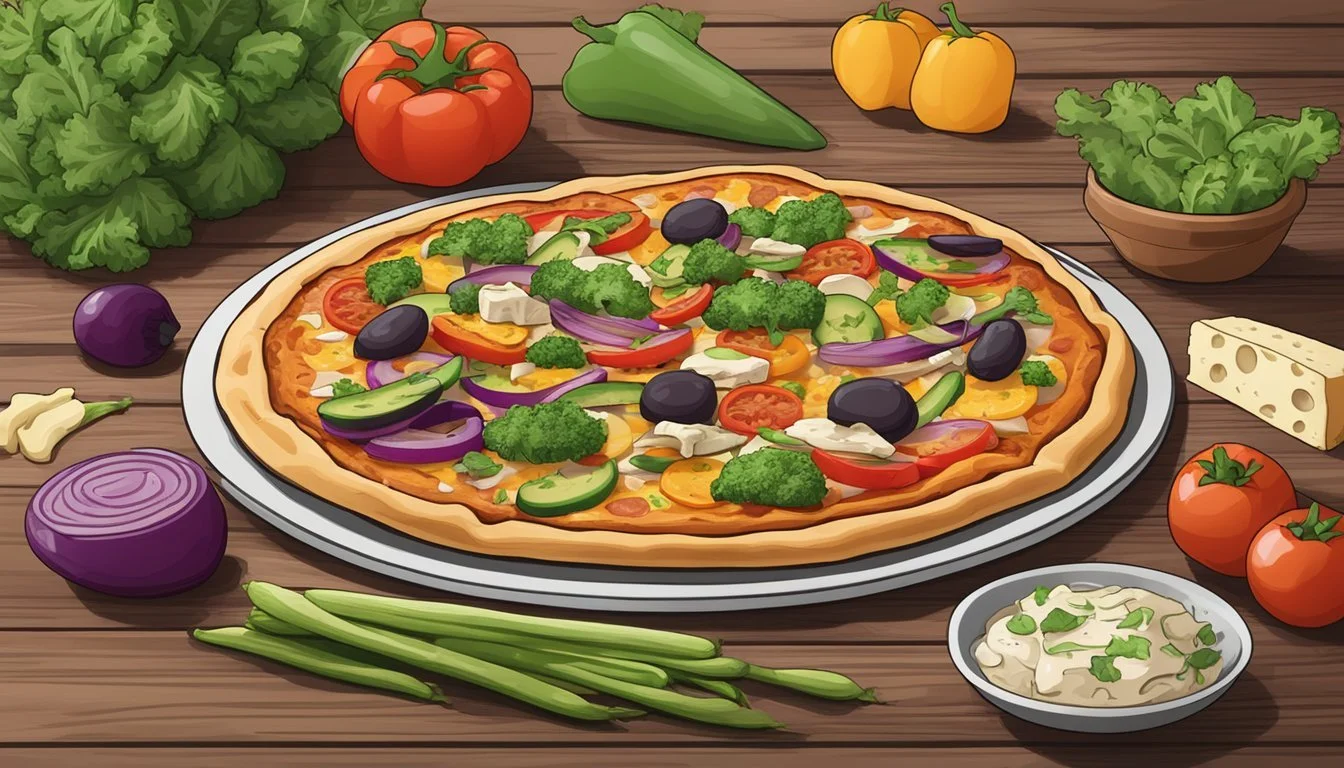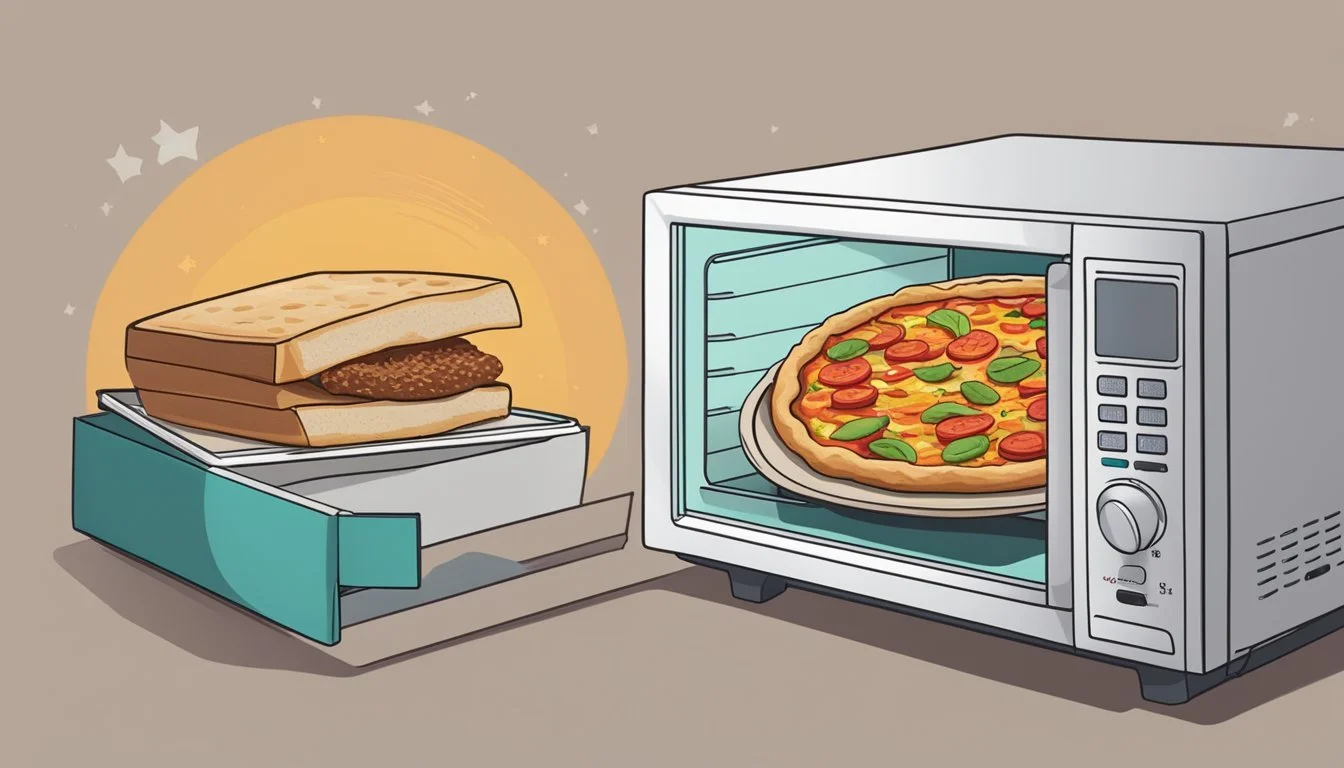Is BBQ Pizza Vegan?
Deciphering Ingredients for Plant-Based Eaters
BBQ pizza, a popular variation in the realm of pizza cuisine, traditionally features a barbecue (What wine goes well with barbecue?) sauce base topped with ingredients like chicken, onions, and cheese. However, there is a growing demand for plant-based alternatives in every food category, including pizzas. Vegan BBQ pizzas are not just a possibility but are becoming increasingly common in both restaurants and home cooking. These pizzas substitute classic toppings with vegan alternatives such as plant-based meats, dairy-free cheese, and an array of vegetables, ensuring that the BBQ pizza experience can be enjoyed without any animal products.
The versatility of BBQ pizza makes it an excellent candidate for veganization. Key to the transformation is the careful selection of ingredients that maintain the smoky, sweet and tangy profile that is characteristic of BBQ sauce, while adhering to vegan standards. For instance, instead of traditional chicken, recipes might call for tofu, jackfruit, or commercially available vegan 'chicken' products that are marinated and prepared to mimic the texture and flavor of barbecued meat. Vegan cheese, an ever-improving product in the dairy-free market, melts over the toppings to create the requisite creamy texture, complementing the BBQ base.
Crafting a satisfying vegan BBQ pizza comes down to ensuring that each component aligns with vegan dietary choices while not compromising on the taste and experience of the dish. This means using a pizza dough that's free from animal-derived ingredients, selecting a vegan-friendly BBQ sauce, and opting for plant-based toppings that provide a mix of textures and flavors. Home cooks and chefs alike are creating vegan BBQ pizzas that stand on their own as delicious alternatives, marking an inclusive shift in the world of pizza cuisine.
Understanding Veganism
This section explores the intricacies of veganism, from its definition and benefits to the substitutes and standards important for maintaining a vegan diet. It also touches on the ways veganism has integrated into various food cultures and culinary practices.
What Is Vegan?
Veganism is a dietary and lifestyle choice where individuals abstain from using animal products and by-products. In terms of diet, this means avoiding meat, dairy, eggs, and honey, and instead focusing on plant-based foods.
Benefits of a Vegan Diet
A vegan diet can be rich in nutrients, like vitamin C and vitamin A, and lower in saturated fats. It may potentially lead to health benefits, such as improved heart health and a lower risk of certain diseases.
Common Vegan Substitutes
Vegans often use alternatives to animal-based ingredients to ensure their nutrient intake is balanced. Examples include:
Protein: tofu, seitan, (What wine goes well with seitan?) lentils
Iron: 4mg servings can be found in legumes and leafy greens
Carbohydrates: grains, fruits, and vegetables
Dairy: vegan cheese, plant-based milk
Veganism and Food Culture
Veganism has found a place in American cuisine and other food cultures, often celebrated on platforms like Instagram for its innovative and customizable recipes, such as vegan barbecue pizza.
Challenges of Veganism
Vegans may face challenges, such as ensuring adequate protein intake, finding appropriate iron sources, and maintaining overall nutrition. Access to vegan options and affordability can also be hurdles.
Vegan Labeling and Standards
Products and meals are often labeled 'vegan' if they contain no animal-derived ingredients. However, cross-contamination during manufacturing can be a concern for strict vegans.
Veganism in the Culinary World
Chefs are increasingly incorporating vegan options into their menus. From high-end dining to fast food, vegan pizza has become a staple, with toppings like cauliflower and vegan cheese and sauces like vegan barbecue.
What Makes a Pizza Vegan?
Vegan pizza swaps out all animal-derived ingredients for plant-based alternatives to meet the dietary choices of those avoiding animal products. These modifications span the crust, cheese, toppings, and sauce, ensuring every element is free from animal influence.
Key Components of a Vegan Pizza
Dough: The foundation of any pizza is the dough. Traditional pizza dough is often vegan, made from flour, water, yeast, salt, and sometimes oil. However, always check for dairy or eggs, which are sometimes present in pre-made dough.
Sauce: Typical pizza tomato sauce is generally vegan, as it consists mainly of tomatoes, herbs, and spices. When considering barbecue sauce, one must ensure it doesn't contain ingredients like honey or Worcestershire sauce, which often has anchovies. (What wine goes well with anchovies?)
Vegan Pizza Toppings
Vegan pizzas are often loaded with a variety of veggies including onions, peppers, tomatoes, and mushrooms. Other plant-based toppings include:
Tofu: seasoned or marinated to add protein
Pineapple: for a sweet, tangy flavor
Chickpeas: tossed in barbecue sauce for a hearty addition
Corn and zucchini: for a fresh, garden-like taste
Choosing the Right Cheese Alternatives
Cheese is a crucial element, and vegan cheese options have greatly expanded. There are various forms, such as shreds, slices, and blocks, made from nuts, soy, and root vegetables. Vegan mozzarella cheese is a popular choice for pizza, melting well and offering a mild, creamy taste. For sauces like vegan ranch dressing, cashews or soy milk can provide the creamy base.
Vegan Pizza Bases and Sauces
Homemade pizza dough can be easily made to ensure its vegan quality, using simple ingredients like flour, yeast, olive oil, and water. For the base, apart from the classic tomato sauce, vegan barbecue sauce can add a smoky flavor, just make sure it doesn't contain non-vegan additives. Vegan pizza can be just as diverse and flavorful as traditional options through conscientious selection of bases and sauces.
The Specifics of BBQ Pizza
BBQ pizza merges the smoky flavors of barbecue with the beloved format of pizza, offering a unique taste that deviates from traditional pizza. This section explores the components that make up a BBQ pizza, highlighting vegan options and discussing the flavor profile and variations that have contributed to its popularity.
What Constitutes a BBQ Pizza?
BBQ pizza is typified by the use of BBQ sauce as the base instead of the standard tomato sauce. Typically, it includes toppings like cooked chicken, onions, and cheese -- all complemented by the robust taste of the BBQ sauce.
Traditional BBQ Pizza Ingredients
BBQ sauce: A sweet and tangy base, often including ingredients like ketchup, vinegar, sugar, and spices such as smoked paprika, garlic, and cumin.
Toppings: Commonly features grilled chicken, onions (often caramelized), and a blend of cheeses like mozzarella and cheddar.
Vegan Alternatives for BBQ Pizza
To create a vegan BBQ pizza, traditional ingredients are replaced with plant-based substitutes:
BBQ sauce: Remains unchanged, as it is typically vegan, but should be verified for honey.
Vegan 'chicken': Options include marinated tofu, tempeh (What wine goes well with tempeh?), or store-bought vegan BBQ chicken.
Cheese: Vegan cheese varieties, such as those based on nuts or soy.
Additional toppings: Might include diced pineapple, vegan ranch dressing, or vegetables like bell peppers and red onions.
Flavor Profile of BBQ Pizza
The flavor of a BBQ pizza is characterized by a mix of sweetness and smokiness from the BBQ sauce, combined with the savoriness of the toppings. Garlic, cumin, and smoked paprika further enhance the barbecue essence, typically balanced with the creamy texture and taste of cheese.
Popularity and Variations of BBQ Pizza
BBQ pizza boasts considerable popularity, particularly in the United States where barbecue cuisine is ingrained in the culture. Instagram and other social media platforms often feature various renditions of BBQ pizza, ranging from the inclusion of different meats like pulled pork to veggie-packed versions for those seeking a lighter option. Vegan BBQ pizza is gaining traction, appealing to those who enjoy bold BBQ flavors without animal products.
Creating Your Own Vegan BBQ Pizza
Crafting a vegan BBQ pizza at home allows for complete control over ingredients, ensuring the end product is vegan-friendly and tailored to personal taste preferences. This section will guide readers through choosing recipes, making homemade sauce and dough, selecting toppings, and providing baking advice to ensure a delightful pizza experience.
Vegan BBQ Pizza Recipes
A variety of vegan BBQ pizza recipes are available online, offering a spectrum of flavors. One could start with a basic recipe that involves a pre-made vegan pizza crust, BBQ sauce, a selection of vegetables like diced red onions and bell peppers, and a vegan cheese substitute. Adjusting the ingredients to include items such as marinated tofu or tempeh can introduce a smoky, protein-rich element to the pizza.
Homemade Vegan BBQ Sauce
Vegan BBQ sauce can be made with a mixture of ketchup, vinegar, brown sugar, smoked paprika, garlic powder, and a hint of cumin. Combine these ingredients in a saucepan over medium heat, stirring occasionally:
Ingredient Measurement Ketchup 1 cup Apple cider vinegar 1/4 cup Brown sugar 2 tbsp Smoked paprika 1 tsp Garlic powder 1/2 tsp Cumin 1/4 tsp
Simmer until the sauce thickens to a desirable consistency.
Preparing the Perfect Pizza Dough
For the dough, one could use a store-bought vegan pizza dough or create a homemade version with all-purpose flour or gluten-free alternatives. The dough should include:
High-quality flour
Active dry yeast
A sweetener like sugar to activate the yeast
Warm water, and a pinch of salt
Allow the dough to rise until it doubles in size for an airy crust.
Selecting Vegan Toppings for BBQ Pizza
The toppings for a vegan BBQ pizza can include a colorful mix of vegetables like red onions, bell pepper strips, diced pineapple for sweetness, and cilantro for a fresh finish. One can also add vegan proteins such as seasoned tofu or tempeh. The key is to chop the toppings finely to ensure even cooking.
Baking Techniques and Tips
Bake the pizza in a preheated oven, aiming for a temperature of around 400°F (200°C) to ensure a crispy crust. Use a pizza stone or a perforated pizza pan to facilitate even heat distribution. The cook time will generally range from 15 to 20 minutes, depending on the oven and thickness of the crust. Rotate the pizza halfway through baking for uniformity.
DIY Vegan Cheese for Pizza
Vegan cheese can be made by blending soaked cashews, nutritional yeast, garlic powder, and a bit of soy milk or water for consistency. For a meltier cheese, adding a starch like tapioca can mimic the stretchiness of traditional cheese. Homemade vegan mozzarella is another option, which can utilize coconut oil and agar-agar to achieve the desired texture.
Nutritional Considerations
When assessing vegan BBQ pizza from a nutritional standpoint, one should consider its caloric content, the balance of macronutrients, and the essential vitamins and minerals it provides.
Caloric Content of Vegan BBQ Pizza
The calorie count of vegan BBQ pizza can vary based on the ingredients used. A typical slice contains 200-300 calories, primarily from the dough and saucy toppings. Gluten-free flour and plant-based yogurt can be used for the dough, affecting calorie density.
Balancing Macronutrients
A well-composed vegan BBQ pizza offers a balance of protein, carbohydrates, and fats:
Protein: Sources can include tofu or BBQ chickpeas, with about 10-15 grams per slice.
Carbohydrates: The dough contributes a significant amount, while vegetables add complex carbs.
Fats: Healthy fats can be added through avocado sauce or plant-based cheeses, contributing to satiety.
Importance of Vitamins and Minerals
Vegan BBQ pizza can be a source of key vitamins and minerals:
Vitamin C: Particularly from toppings like tomato-based BBQ sauce, which aids immune function.
Vitamin A: Found in vegetables like tomatoes, contributing to good vision and skin health.
Iron: A pizza with fortified ingredients or spinach can provide up to 4 mg of iron, important for oxygen transport in the blood.
Storage and Reheating
When it comes to vegan BBQ pizza, ensuring proper storage and reheating methods is key to maintaining flavor and texture. The right techniques can extend a pizza's shelf life and ensure it remains as enjoyable as when it was first baked.
Proper Storage Techniques
To preserve vegan BBQ pizza effectively, one should let the pizza cool to room temperature to prevent condensation within the storage container. It should then be stored in an airtight container or securely wrapped in plastic wrap. If kept in the refrigerator, pizza can maintain quality for 3 to 4 days.
Best Methods to Reheat Vegan BBQ Pizza
For reheating, the best method is using an oven or a toaster oven to keep the crust crispy. Preheat the oven to 375 degrees Fahrenheit and place the pizza on a baking sheet if available. Heat for about 10–15 minutes or until the cheese appears melted and the pizza is heated through.
Freezing and Thawing Pizza
Freezing is an option for longer storage. One should wrap individual slices or the entire pizza in plastic wrap, then place it in a freezer-safe airtight container before placing it in the freezer. Frozen pizza can be stored for 2 to 3 months. To thaw, let the pizza sit in the refrigerator overnight or defrost it in the microwave using the designated defrost setting to avoid sogginess.
Shelf Life Considerations
Shelf life differs based on storage methods. In the fridge, pizza lasts a few days, while in the freezer the shelf life extends significantly. Remember, freezing can alter texture slightly, particularly with toppings, so one might experience a slightly different taste upon reheating.
Tips for Keeping Pizza Fresh
To retain the freshness of the vegan BBQ pizza, it's advisable to:
Store slices flat in an airtight container to avoid toppings sticking to the cover.
If using a microwave to reheat, place a cup of water alongside the pizza to help keep the crust from getting chewy.
Never leave pizza out at room temperature for more than 2 hours to prevent bacterial growth.






